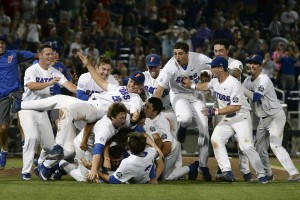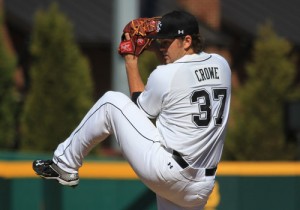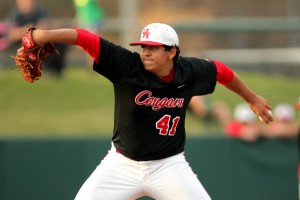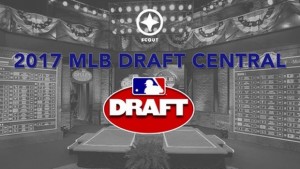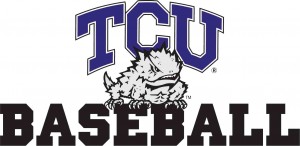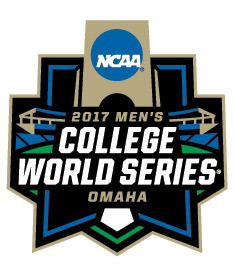
Here’s a recap of our CWS coverage so far for 2017:
Now we’re through the Regionals and the field has been winnowed from 64 to just 16.
We’ll review the 16 regionals in order of the larger bracket. Bold is the host and Bolded Red is the winner. We’ll also highlight significant players and/or guys who are big names in the upcoming draft as we get to them.
It was a crazy set of regionals; by Sunday night only 6 of the 16 brackets were decided; a slew of regionals were forced to monday games (two weather delays involved). And we saw one of the biggest upsets in recent memory. Read on.
Regional Recaps
In the #1 Oregon State regional, Oregon State held serve easily while Yale scored the unlikely upset over Nebraska in the 2/3 game. In the winners bracket game, Oregon State blitzed Yale 11-0 behind Luke Heimlich‘s 7ip-2hit performance. Holy Cross sent home Nebraska in the loser’s bracket, cementing their status as a drastically over-seeded team from the Big-10. In the regional final, Oregon State again crushed Yale 8-1 to cement their status as the #1 team in the land and advance to Super Regionals.
In the #16 Clemson regional, Vanderbilt crushed an over-ranked St. John’s team in the opener (an upset not by seeding but by ranking) while Clemson snuck by UNC-Greensboro. In the losers bracket, St. Johns was sent home 2-and-out by UNCG while Vanderbilt blitzed by Clemson 9-4. Clemson fought their way out of the loser’s bracket and then forced the Monday decider with a 6-0 win over Vandy. In the do-or-die game though, Clemson never got started and Vanderbilt advanced 8-0.
In the #8 Stanford regional (which started a day early), both top teams blasted inferior competition to setup a Stanford-Cal State Fullerton winner’s bracket game. In that game, Fullerton won easily to put themselves into the driver’s seat. Sacramento State became the first team eliminated thanks to this regional starting a day early to placate BYU. Stanford made their way back to the title game, but were beaten again by Fullerton, making Cal State Fullerton the upset winner and the first team to advance.
In the #9 Long Beach State regional, Texas beat UCLA for the fourth time this season (beating UCLA’s ace and likely 1st rounder Griffin Canning along the way), while host Long Beach State beat SDSU easily. In the winner’s bracket game, Texas’ Morgan Cooper (the Nats 2014 34th round pick) threw a solid game and the Longhorns got into LBSU’s bullpen for an extra inning’s victory. UCLA went 2-and-out in the loser’s bracket game; yet another example in SDSU of a #4 seed not finishing 4th. Long Beach got back to the deciding game and took one from Texas, forcing the Monday finish. There, Long Beach State got 2 runs early and made them stick, advancing through the loser’s bracket and setting up an in-conference matchup with Fullerton.
In the #5 Texas Tech regional, the hosts won easily while Sam Houston state took it from Arizona in a 2/3 seed upset. TT took out Sam Houston easily in the winner’s bracket. However the pesky #3 seed Sam Houston took out Arizona again, then took a game from TTU to force the Monday decider. There, the amazing happened, with tiny Sam Houston State beating the #5 national seed again and becoming the 2nd most unlikely regional winner this year.
In the #12 Florida State regional, Auburn scored the slight upset over UCF in the opener and then Tennessee Tech took out Florida State for 2 upsets in a row. Auburn won the winner’s bracket game while FSU kept their hopes alive in the elimination game. Florida State grinded their way back to the final and then took a walk-off win over Auburn to force the Monday decider. Florida State made the decider a non-issue, dominating Auburn and winning 6-0 to advance.
In the #4 LSU regional, both top seeds won in an offense-minded regional, scoring double digits. The region continued to go chalk with both seeded teams again winning and again scoring in the double digits. Rice beat out SELA to get to the regional final, but there LSU got 8 shutout innings from its #3 starter Eric Walker and they advanced to the super-regionals.
In the #13 Southern Miss regional, the host won a barn-burner to avoid a first round upset against Illinois-Chicago while South Alabama upset SEC power Mississippi State. Southern Miss held-serve to advance to the final, while Mississippi State got revenge against South Alabama to reach the regional final. There, the SEC power Mississippi State took two from Southern Miss to advance.
In the #2 UNC regional, Davidson took it to upper 1st rounder J.B. Bukauskas and knocked him out early, then held on for the day’s biggest upset over UNC. Meanwhile FGCU easily topped Michigan to setup a very weird winner’s bracket game. Bukauskas’ final collegiate performance (coupled with his struggles in the ACC tournament) may have cost him draft spots; lots of mocks have him going 6th overall, but now I think he falls. In the winner’s bracket game, Davidson again defied the odds, taking out FGCU while UNC salvaged some hope with an easy 8-1 win over the over-seeded Michigan team (again showing why the Big-10 did not deserve as many teams in the CWS as they got). UNC made it back to the regional final, but their bats came up empty as Davidson shocked the baseball world and took the regional 2-1. The most amazing thing I heard about Davidson this week? They only gave out three (3) scholarships. Three! UNC probably has 3 full-rides just in its rotation.
In the #15 Houston regional, both top seeds were upset, with TAMU and Iowa topping Baylor and Houston respectively. And Iowa did it without any input from their cleanup slugger Jake Adams (who had 27 homers this season). Houston took out some aggression on Baylor in the elimination game, winning 17-3, while TAMU (who were supposedly one of the last four teams in) took the winner’s bracket game to hold the driver’s seat in this regional. Houston made it back to the title game with a win over Iowa, but couldn’t take out Texas A&M, who won the regional and likely won the right to host a super-regional despite not being a regional host.
In the #7 Louisville regional, both top seeds advanced with ease (Oklahoma and Louisville). Louisville destroyed Oklahoma 11-1 in the winner’s bracket game behind top-pick Brendan McCay‘s 6 1/3 innings of one-run ball (to go along with his batting clean-up as perhaps the best two-way college player we’ve seen in a while). Virginia’s Radford went two-and out as the #4 seed. Xavier blitzed Oklahoma in the loser’s bracket final, but then couldn’t hang with Louisville in the regional decider, losing 8-7 as Louisville advances.
In the #10 Kentucky regional, Kentucky survived a late rally to top Ohio in the opener while under-seeded NC State topped Indiana in a 2/3 seed upset. NC State showed why they were underseeded as a #3 by taking out the host in the winner’s bracket game. Kentucky made it back to the regional final, and took a game from NC State to force the extra decider. There, hand it to Kentucky, they got the win they needed and advanced to setup a great in-state super-regional.
In the #6 TCU regional, all games were delayed a game due to rain to start. Both top seeds advanced, with UVA getting a strong performance from #2 starter Derek Casey over the tough Dallas Baptist team. In the winner’s bracket game, UVA’s Daniel Lynch got hit early and their hitters could do nothing with TCU’s Jared Janczak and they lost 5-1. UVA has to face DBU again, as DBU eliminated #4 seed Central Connecticut in the loser’s bracket. In the loser’s bracket final rematch between UVA and DBU, UVA’s thin pitching staff was finally exposed, giving up 9 runs in the first two innings (Evan Sperling could not record an out as the starter) and never getting all the way back. It didn’t matter much, as TCU destroyed DBU in the final to advance and show why they were the consensus #1 ranked team pre-season.
In the #11 Arkansas regional, the host won easily while the day’s best game featured Missouri State getting a do-or-die walkoff 2-run homer to top Oklahoma State. Missouri State showed they belong by upsetting the hosts in the winner’s bracket game while Oral Roberts pounded OK-State in the elimination game. Arkansas made it back to the regional final, taking an 11-10 wild game from Missouri State to force the extra decider on Monday. There, Missouri State gritted out the win over Arkansas to advance.
In the #3 Florida regional, the hosts and South Florida easily advanced to hold serve against lower-seeded competition. The region continued chalk with Florida scoring 4 in the 12th to ease past South Florida (Florida threw their ace Alex Faedo in this game; he delivered with 7 innings of one run ball). Bethune Cookman advanced out of the losers’s bracket and promptly took a game off of Florida, forcing the extra regional decider Monday. There, Florida outlasted tiny Bethune to advance as expected.
In the #14 Wake Forest regional, the two top seeds both battered Maryland teams UofMaryland and UMBC. In the loser’s bracket, UMaryland committed some Terrapin-on-Terrapin crime by destroying them 16-2, while Wake held on for a win over WVA in the winner’s bracket. WVA took advantage of Maryland’s thin pitching corps to advance to the regional final, but lost 12-8 as Wake Forest advanced.
Predictions versus Actuals
My Predictions: Oregon State, Vanderbilt, CS-Fullerton, Long Beach State, Texas Tech, Florida State, LSU, Mississippi State, UNC, TAMU, Louisville, Kentucky, UVA, Arkansas, Florida, Wake Forest.
Actuals; Oregon State, Vanderbilt, CS-Fullerton, Long Beach State, Sam Houston, Florida State, Mississippi State, LSU, Davidson, Tamu, Louisville, Kentucky, TCU, Missouri State, Florida and Wake.
I got 12 of 16 right. I missed on Davidson and Sam Houston State (like every one else), but over-thought the TCU/UVA matchup, forgetting how good TCU was, and missed on the Arkansas/Missouri State matchup.
Summary of Regionals statistically:
- 9 of 16 hosts advanced, including 5 of 8 National seeds. National Seeds losing: #2 UNC, #5 Texas Tech, #8 Stanford.
- 3 first time Super-Regional participants; Davidson, who was also a first time REGIONAL participant. Sam Houston State. Kentucky is also a 1st timer despite being seeded.
- 7 = number of regionals forced into the “extra” deciding game: Vanderbilt/Clemson, Long Beach/Texas, Texas Tech/Sam Houston, FSU/Auburn, Kentucky/NC State, Arkansas/Missouri State, Florida/Bethune-Cookman.
- 9 number one seeds, 4 number two seeds, 2 number three seeds, and 1 number four seeds advance to the super regionals.
- 7 number of #4 seeds who didn’t finish 4th in their regional; Holy Cross, UNC-G, SDSU, Tennessee Tech, Davidson, Iowa, Oral Roberts. That’s great balance.
- Zero hosts that went 2-and-out this year.
- 1 of the regionals went pure chalk (Wake Forest). That’s either a great testament to the balance of the tournament, or a real indictment of the seeding of #2s versus #3 teams.
- #4 over #1 openers: Davidson over UNC, Tennessee Tech over Florida State, Iowa over Houston
- Most surprising regional winner: Davidson easily, followed by Sam Houston State.
Conference Breakdowns of the teams in the Super Regionals:
- SEC: LSU, TAMU, Vanderbilt, Mississippi State, Kentucky, Florida
- Big12: TCU
- ACC: Louisville, Wake Forest, Florida State
- Pac12: Oregon State
- Big West: Cal State Fullerton, Long Beach State
- Atlantic 10: Davidson
- Southland: Sam Houston State
- Missouri Valley: Missouri State
9 of the 16 super regional teams from the two power conferences ACC and SEC. The Big12 was the #1 ranked RPI conference and placed 7 teams into the tourney, but just one advanced, perhaps an indictment of these conference RPI rankings in general. But, with 8 conferences represented overall, there’s good spread. Only the Big10 really didn’t show up, putting 5 teams in the tourney and faring horribly. It seems like this is a recurring theme; Big10 gets 5 teams in and does nothing while higher ranked conferences like the AAC and C-USA put in fewer teams (3 and 2 respectively). I doubt anything will change in the future; the committee seems to fall in love with wins (not one eligible team with 40+ wins missed the tourney) and with marginal big-conference teams in lieu of better teams from smaller conferences .
Super Regional Matchups: the higher ranked team is the host in each case.
- #1 Oregon State vs Vanderbilt
- Davidson vs TAMU
- #3 Florida vs #14 Wake Forest
- #4 LSU vs Mississippi State
- Sam Houston State v #12 Florida State
- #6 TCU v Missouri State
- #7 Louisville v #10 Kentucky
- Cal State Fullerton vs #9 Long Beach State
Super Regional Thoughts:
Hard not to pick Oregon State, who looks the part of a #1 ranked team. Also hard to pick Davidson to continue their upset run, so I’ll go with TAMU based on experience.
I’ll take Florida over Wake, despite Wake’s being rather under-rated. They lost only two weekend series allyear, both away to top teams. But Florida has the ace in Faedo and the cache.
A SEC rematch between LSU and Mississippi State might be a laugher; LSU swept MSU on their field in their weekend series earlier this year, and LSU will host. Look for two quick wins for the National power.
As with Davidson, its hard to give Sam Houston a shot at the veteran Florida State team.
The in-state Kentucky matchup between Louisville and Kentucky is a good one; they met twice in mid-week games and split them, but those games (both throwing mid-week starters) aren’t a great predictor. I like Louisville’s pitching and experience here.
The final matchup, between two Big West teams, seems easy enough to call on paper: Long Beach State and CS-Fullerton met 6 times this year and Long Beach won five of them. I’m guessing LBSU hosts, where they swept Fullerton earlier this year. I think the Dirtbags should advance easily.
Super Regional Star Power
Lots of top-end draft picks will be playing this weekend, just ahead of the MLB draft which starts on 6/12/17. By Super Regional:
- Oregon State/Vanderbilt: the likely #1 overall draft pick Kyle Wright, also Kendall, plus Oregon State’s two dominant starters Heimlich and Jake Thompson.
- Davidson/TAMU; none really.
- Florida/Wake Forest: Alex Faedo mostly.
- LSU/Mississippi State: Alex Lange for LSU, Brendan Rooker for MSU.
- Sam Houston State/Florida State; none really, despite FSU’s ranking.
- TCU/Missouri State; MSU’s Jake Burger; TCU is led more by under-classmen but does have Evan Skoug who might get drafted relatively highly.
- Louisville/Kentucky; Louisville of course led by possible #1 overall pick Brendan McKay.
- Cal State Fullerton/Long Beach State; no 1st round notables.
MLB.com has a nice summary with all the above names plus more.
CWS Predictions: Oregon State, TAMU, Florida, LSU, Florida State, TCU, Louisville, Long Beach State.
Or, in the CWS groupings: Oregon State, CS Fullerton, FSU, LSU in one bracket, and TAMU, Louisville, TCU and Florida in the other.
That’d be a great CWS field.
College CWS tournament references:
